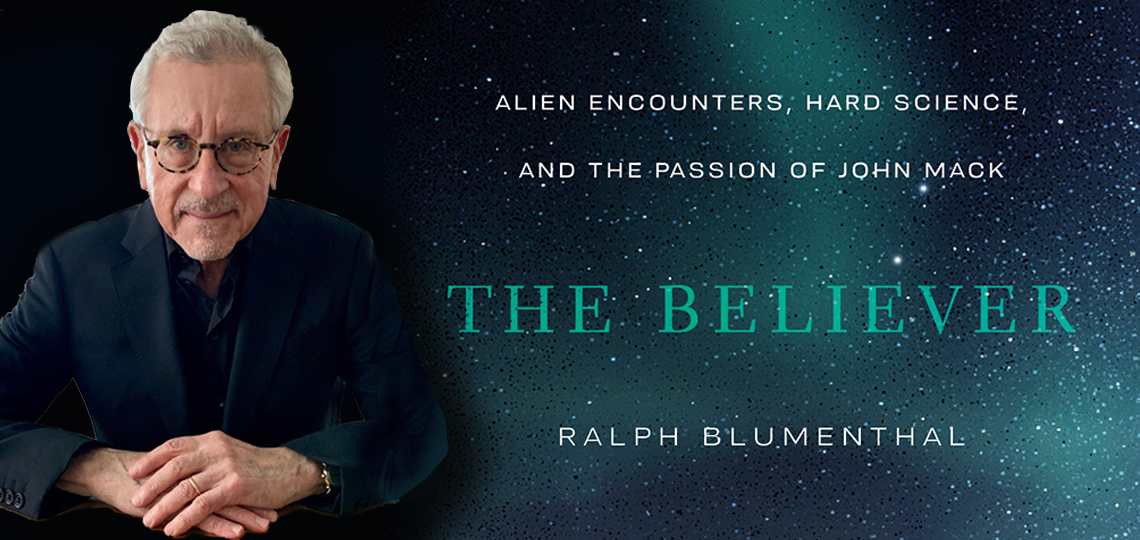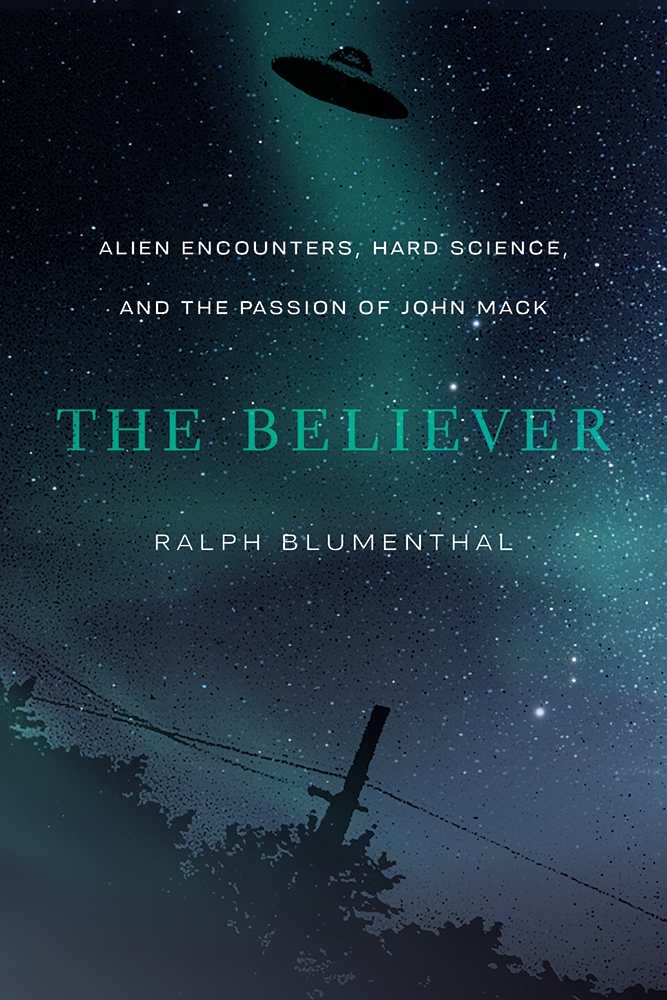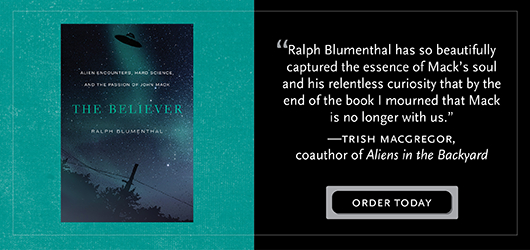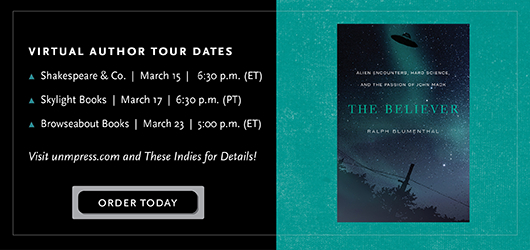An Interview with Ralph Blumenthal, Author of The Believer: Alien Encounters, Hard Science, and the Passion of John Mack

One of our favorite books of the March/April 2021 issue introduced us to John Mack, a brilliant author and top Harvard Medical School psychiatrist who inexplicably developed an obsession with alien abduction—and nearly lost his career because of it. In The Believer, Ralph Blumenthal chronicles this fascinating life story—Mack’s childhood in New York, founding the psychiatry department at Cambridge Hospital, a Pulitzer-winning biography of T.E. Lawrence, antinuclear activism—in addition to his wayward turn to using “hypnotic regression to unlock the suppressed memories of ‘experiencers’ of alien encounters,” in the words of Amy O’Loughlin in her review for Foreword.
With an assist from High Road Books, we connected Ralph and Amy for the following Mack conversation. Be forewarned: you might become a believer too.
The Believer is the product of fifteen years of extensive research. Before you began this undertaking, what was your opinion of John E. Mack and his work? Did your view of him change at all during your research? If so, how and to what degree?
Until I stumbled on Mack’s second book, Passport to the Cosmos, as Texas correspondent for The New York Times in 2004, I had no opinion of him. I had never heard of him, which is why I thought of writing a piece on him. Imagine my surprise when I discovered how famous, or infamous, he already was. When he was run over and killed by a drunk driver in London that year, I started thinking of a book. But my one-dimensional view of him as an eminent Harvard psychiatrist captivated (not captured) by aliens, soon gave way to a more nuanced picture of someone deeply moral and dedicated to bettering conditions in this world (disarmament, Middle East peace, environmental conservation etc.) while coming to investigate another world of fantastic happenings that couldn’t possibly be real and yet somehow seemed to be. I conclude he is hero, flawed for sure like the rest of us, but heroic as Joseph Campbell might portray him, a solitary human being who sets forth on a difficult journey, endures many tests, and returns with a boon for humanity’s sake.
You write that Mack was fascinated by heroism. In his biography of T.E. Lawrence, Mack concludes that Lawrence exhibited a deep need to be heroic, and he quotes: “‘The hero as he appears in the tangle of modern life is a man struggling with a vision he could neither realize nor abandon.” Given Mack’s “psychological makeup” and his identification with Lawrence, do you think Mack harbored a similar need to be heroic?
Yes, he did at times model himself after Lawrence, as the psychiatrist in him recognized. His nephew even warned that in Mack’s dealings with hostile Harvard supervisors, he may have been seeking to martyr himself like Lawrence.
In addition to being a highly detailed biography, your book is a comprehensive history of UFOs and alien contact that ranges from the nineteenth century to the present day. Was it challenging to balance this informative ufology with the multidirectional details of Mack’s life?
It was indeed hard to encapsulate the incredibly complicated story of UFO sightings throughout history (not just the 19th century but going back to antiquity) and mesh it with Mack’s own turbulent history. As scholars of the UFO phenomenon will undoubtedly note, I only skim the surface of this voluminous record of cosmic anomalies and refer readers to other sources, like Jerome Clark’s magisterial UFO Encyclopedia.
Mack is beleaguered by the demand for scientific evidence to prove the “ultimate truth” of alien abduction phenomenon. Yet, there is a scene in your book where Mack decides to share his interest in abduction with Lester Grinspoon, his colleague and former Harvard roommate, and Carl Sagan, renowned cosmologist and planetary scientist. A meeting is set up. Mack hints that he has possession of an alien tracking device, and Grinspoon urges him to bring it to the meeting. Mack doesn’t, but says later that he will have its components tested. There isn’t any further mention of the device or the test results in the book. What happened? Why didn’t Mack present this physical evidence to prove his claims?
I see you read the book carefully. I never got to the bottom of this strange episode. By the time I got to interview Grinspoon, he no longer had a clear recollection of the episode. Sagan was dead and Mack never referred to it that I could find. So there was simply no way of resolving the question. But clearly, it’s troubling. Why would Mack say he had an alien wand if he couldn’t or wouldn’t produce it?
You mention you first learned about John Mack in 2004 after discovering his book Passport to the Cosmos, the sequel to his controversial Abduction: Human Encounters with Aliens. That same year, Mack was struck by a drunk driver and killed “in a suspiciously freakish demise that seemed anything but accidental.” Are you implying that Mack’s death was nefarious or criminal or even perhaps supernatural?
Many people (including me when I picked up the paper and was stunned to see Mack’s obituary) did immediately suspect foul play—not on the part of aliens but perhaps adversaries. I wanted to convey that initial aura of menace and widespread suspicion. But they were erased as I reviewed the British police reports and court records. They left no doubt that Mack was run down by a hapless London charity worker who had over-imbibed in bitter shandys. Period.
That’s apart from Mack’s growing interest in survival of consciousness—life after death—and expressed weariness with all his struggles. In some way he may have been preparing or even looking forward to death. He may also have been careless when he stepped out of the underground station that night. So, as he wrote about Lawrence, his death was an accident, but perhaps not entirely accidental.
You write that Mack had little patience with people who asked if he believed in aliens and UFOs. It’s assumed that you are repeatedly asked the same question and may feel similarly vexed. So, instead, what are your thoughts about “transcendent encounters with the ineffable?” How do you view the “cryptic experiences that so enraptured Mack?”
I have not myself experienced any UFO sightings or alien encounters. But when asked if I “believe” in them, I say, like Mack, that it is not a question of belief but of investigating the evidence, such as it is, and trying to understand things that seem impossible and yet remain powerfully real to the experiencers. That’s why I called my book The Believer—not because Mack was gullible (though he could be) but because he believed in social justice, cosmic intelligence, and breaking boundaries to explore the deepest mysteries of existence. That there are unidentified things in the sky is not a matter of belief—we don’t know what they are but they’re there. Likewise, countless people of all ages all over the world have told similar stories of encounters with alien beings. They are not crazy, hoaxters, or publicity seekers, as Mack established. Something happened, although we can’t say what. We don’t have the tools now to resolve these questions but we need to keep an open mind, as new findings in physics stretch our comprehension of reality. One thing is for sure: we don’t yet know all there is to know.
The Believer
Alien Encounters, Hard Science, and the Passion of John Mack

Ralph Blumenthal
High Road Books
Hardcover $29.95 (352pp)
978-0-8263-6231-5
Buy: Amazon
The Believer is the expansive story of John E. Mack, a preeminent Harvard Medical School professor and psychiatrist whose exploration of alien abduction phenomena nearly destroyed his career and reputation.
Born in 1929 to wealthy German Jewish academics, Mack grew up in New York. His mother died when he was young; her loss caused a lifetime of abandonment trauma and inspired his interest in psychiatry. He entered Harvard in 1951 and later joined the faculty, founding the department of psychiatry at Cambridge Hospital.
In 1976, Mack published A Prince of Our Disorder, a Pulitzer Prize-winning biography of T. E. Lawrence (of Arabia); in the eighties, he became an antinuclear activist. He also turned to psychedelics and breathwork to assuage his psychological pain. Both opened him up to a range of psychospirituality, priming his belief in anomalous experiences.
In 1991, Mack met Budd Hopkins, a pioneering UFO abduction investigator. Hopkins explained his use of hypnotic regression to unlock the suppressed memories of “experiencers” of alien encounters. Mack was hooked. Within a year, he was counseling his own experiencers. He collected encounter stories that varied from benign abductions to the “forcible harvesting of…eggs and sperm for human-alien hybrid reproduction.”
Hard scientific proof was elusive, Mack acknowledged. He focused on the transpersonal, on experiencers’ authenticity and emotional intensity; he found that experiencers exhibited no psychopathology. But colleagues still derided him for “conclusion-jumping,” and Carl Sagan chided him with a quip: “extraordinary claims require extraordinary evidence.” Soon, Harvard came for a reckoning.
Based on fifteen years of research, interviews, and exclusive access to Mack’s archival material, The Believer is the story of a brilliant man whose breadth of interests generated a lifetime of achievements. Believers will appreciate the book’s extensive cosmic phenomena, and nonbelievers will find a unique chronicle of an unquenchable human spirit.
AMY O'LOUGHLIN (February 27, 2021)
Amy O'Loughlin



